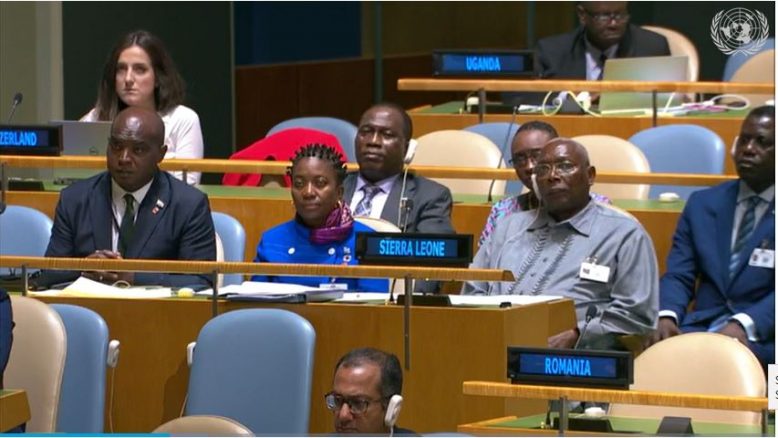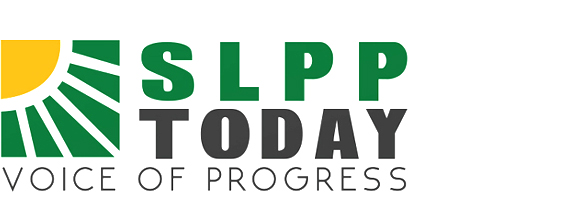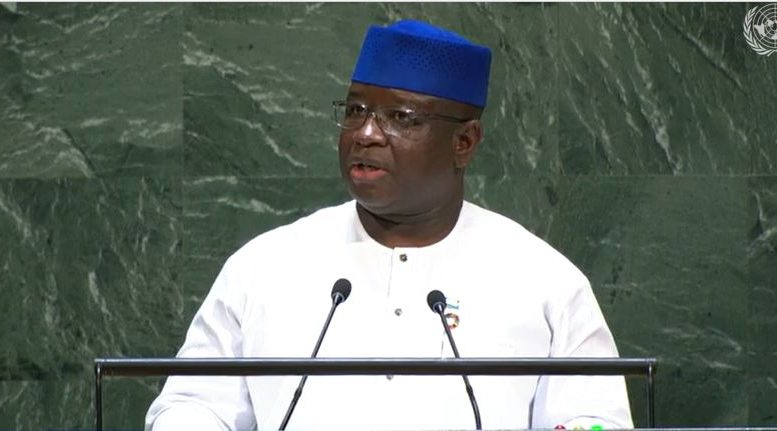Address by His Excellency President Dr. Julius Maada Bio at the 74th session of the United Nations General Assembly in New York on Thursday 26th September 2019
Mr. President,
Colleague Heads of State and Government,
Distinguished Ladies and Gentlemen,
I congratulate you Mr. President, on your assumption of the responsibility to steer the work of the Seventy-Fourth Session of the General Assembly. I assure you of Sierra Leone’s full support during your tenure.
I applaud Her Excellency Madam Fernanda Espinosa Garces of Ecuador, for the effective manner in which she conducted the previous session.
I commend Secretary-General Antonio Gutteres for his overall dedication and commitment to the work of the Organization, including his efforts in advancing the urgent need to address Climate Change.

We commit in prayer, memories of the late President Robert Gabriel Mugabe. He was a dedicated pan-Africanist whose pursuit of African integration, cooperation and solidarity shall forever remain in our minds and hearts.
Mr. President,
The theme for this year, “Galvanizing multilateral efforts for poverty eradication, quality education, climate action and inclusion,” builds on commitments we made over the years. The issues are at the heart of the 2030 Agenda for Sustainable Development. We therefore commend you for the timely choice of a theme that resonates with the aspirations of the people whom we all represent.
Mr. President,
Sierra Leone supports the principle of collective engagement in both the prevention and settlement of conflicts and disputes, as well as the Secretary-General’s reform agenda in sustaining peace in all its facets, including the efforts to reform peacekeeping.
As a Troop and Police Contributing Country, Sierra Leone’s active participation in peacekeeping operations demonstrates our firm commitment to the promotion and maintenance of international peace and security. Let me reiterate this firm commitment to continue to contribute our fair share to maintaining world peace.
Mr. President,
The need for Security Council reform is urgent and imperative. Our historic pledge to the early reform of the Security Council as an essential element of our overall effort to reform the United Nations must be upheld and implemented without further delay. The legitimacy and effectiveness of the Security Council’s decisions, as well as the relevance of the United Nations, will continue to be questioned if urgent action is not taken to make the Council more broadly representative.
Africa remains to be the only region without representation in the permanent category of the Security Council, and is also under-represented in the Non-permanent category.
In this context, Africa’s demand for two Permanent seats with all the rights and prerogatives of current members, including the right of veto, and two additional Non-permanent seats is a matter of common justice and the right to have an equal say in decision-making on issues pertaining to international peace and security. This long-standing injustice and imbalance perpetuated in the present configuration of the Security Council should be of grave concern to us all, which ought to be addressed.
As the Coordinator of the African Union Committee of Ten Heads of State and Government on the reform of the United Nations Security Council, we are convinced that this reform should address the long-standing injustice and imbalance in the present configuration of the Council.
We believe that the prevailing geopolitical realities are compelling for a comprehensive reform of the Security Council to make way for equitable geographic representation. Africa’s patience is being tested.
We therefore urge this Assembly to collectively support our urgent call for Africa’s representation in the Security Council, as espoused in the Ezulwini Consensus and Sirte Declaration.
Mr. President,
We pursue peace as a public common good and we have played an important role in securing peace as a stand-alone Goal in the 2030 Agenda. There is a strong case to make for the voices of billions of people living in conflict affected countries to be heard in the highest global decision-making organ, in particular, the g7+ countries.
Sierra Leone has pursued country-led peace and resilience through national dialogue and reconciliation. We recently concluded a broad-based national consultative conference, Bintumani III, where a nationally representative body resolved to establish a permanent and independent national commission for peace and cohesion. We do so, mindful that peaceful coexistence and inclusive governance are pre-requisites to our development.
Mr. President,
Development and poverty eradication must be well-planned, inclusive, and sustainable. It must transition our nation out of fragility.
To this end, Sierra Leone has partnered with United Nations agencies and development partners to understand the dynamics and severity of poverty, and map out possible approaches to eradicating poverty, SDG 1. This has culminated in the production of a national multi-dimensional Poverty Index, a report on multi-dimensional child poverty, and Sierra Leone’s Population Policy in order to effectively measure and monitor.
Mr. President,
The aspirations of Sierra Leoneans are reflected in a detailed and costed Five-Year Medium-Term National Development Plan, titled “Education for Development”. The Plan, aligned with the United Nations’ 2030 Agenda for Sustainable Development and the African Union’s Agenda 2063, is based on an inclusive nationwide consultative process. It ensures that people are at the centre and own our national development trajectory.
Mr. President,
Eradicating poverty can only be achieved when we develop and improve on our nations’ greatest resource – the people. Skilled, healthy, and productive human beings are the pathways to global success and prosperity.
As a nation, we see human capital development as a critical enabler for achieving the SDGs. My Government has therefore allocated 21% of the national budget to education. Consequently, pre-primary to secondary school education is free irrespective of gender, ability, or ethnicity and we now have 2 million children enrolled in school.
We have expanded opportunities in education for girls by creating safe spaces in schools, campaigning vigorously against early marriage and sexual and gender-based violence. Girls admitted to study STEM disciplines in colleges are guaranteed scholarships. Technical and vocational education centres are now accessible to more Sierra Leonean girls and youth; and, we are investing more in school infrastructure, transportation, sanitation and health, feeding, and retention programmes.
We are restructuring and redesigning our education system to deliver quality education that serves inclusive, sustainable, national and private sector development. Our focus is to achieve fundamental, age-appropriate learning outcomes in literacy, computational skills, and critical thinking. We invite the world to work with us!
Through the Directorate of Science, Technology, and Innovation, we have developed a Human Capital Development Incubator with extensive real-time data on education in Sierra Leone and other components of our human capital development flagship programme. Policy interventions and investments in education, healthcare and food security are increasingly informed by and driven by this real-time data.
Sierra Leone continues to use the power of data to plan, make policy decisions, allocate resources, guide governance, and open new possibilities for private entrepreneurship, and drive human capital development.
We are open to partnerships; we are open to collaboration; we are open to ideas about how to continue improving the quality of education because we believe that our success in a global digital economy in the Fourth Industrial Revolution, is predicated on our investment in the future of our children.
Mr President,
Through partnerships and innovation, we have made great progress in establishing legal identity and birth registration, by strengthening our National Civil Registration and Vital Statistics Systems. We have also unrolled Africa’s first Block Chain National Digital Identity Platform (NDIP) that will help citizens grant access to approved institutions to digitally verify their identities. Governance, development planning, financial inclusion, and human rights imperatives, among others, guide our initiative to establish legal identity using a singular, securitised, and serially numbered instrument. We can also use the same instrument to strengthen healthcare planning, health information systems, disease surveillance, and monitor public health interventions and outcomes.
Mr. President,
The threat of inequality, lack of opportunity and exclusion of our youth still persist. The anxiety over the growing youth population in Africa is complicated by increased poverty indicators, youth exclusion, perilous migration across the Mediterranean, transnational organized crime, terrorism and violent extremism, and greater national and regional security threats.
Sierra Leone is addressing the youth question through financial and social inclusion programmes, skills training, and farming initiatives. We are pleased to be among ten countries selected by the United Nations as pilot in the recently launched United Nations Youth Strategy. We look to collaborate across the region and with international partners, and share lessons and best practices.
Mr. President,
Our development agenda is inclusive and affirms the critical role of women. We have ratified the UN Resolution on Women, Peace, and Security. We are addressing the inclusion of women in governance and entrepreneurship. Our actions on child marriage, rape, and sexual and gender-based violence have been emphatic and uncompromising. We have passed progressive laws on sexual offences and a Presidential Task Force directly advises the presidency on Sexual and Gender-based violence. We are also working to eliminate barriers to the inclusion of persons with disabilities.
Mr President,
Quality, affordable, and universal healthcare coverage is foundational to productivity and overall well-being. This is critical for our human capital development agenda. As a nation, we cannot afford the cost of not investing in healthcare and universal healthcare coverage. We have maintained a rights-based approach to healthcare coverage that aligns with SDG 3. We are focused on and request cooperation on reducing maternal and child mortality; preventing epidemics, tropical, and communicable diseases through increased disease detection, surveillance, and control; providing primary health care in accordance with the Astana Declaration; providing first-rate, in-country medical diagnostic facilities; and strengthening capacity and resilience in healthcare service delivery. Through all these efforts, we are leveraging innovation and technology to support healthcare delivery.
We also believe that we cannot achieve Universal Health Coverage without delivering mental healthcare for all. We are rewriting the mental health legislation and we are committed to Community-based Mental Health Care and treatment. We aim to change attitudes to mental health and provide affordable and integrated quality care that matches the burden of mental health conditions. We therefore welcome partnerships towards achieving that goal.
Mr President,
Our focus as a government remains the delivery of accountable and transparent governance of the state through critical debates and engagements with all citizens on rights, governance, and development.
We continue to work with civil society and the press as we expand democratic space. My government has forwarded to parliament a bill to completely repeal a 54-year old law that criminalises libel, which has been used by past governments to imprison journalists and restrict press freedoms.
As Co-Chair of the Task Force on Justice, we strongly identify with and reiterate the Secretary General’s call for accelerated commitments to addressing gaps in the delivery of justice. We have signalled that commitment as a country by establishing a special directorate within the Ministry of Justice to monitor, evaluate, and report on progress on ‘Access to Justice’ for our most vulnerable. We are also using technology and innovation to digitise our court processes and thus fast-track justice delivery for all.
We have undertaken governance reforms that foster the rule of law and public accountability. We continue pursuing a determined fight against corruption while minimising the waste and abuse of state resources. We are implementing business-friendly reforms that create a conducive eco-system for private capital investments and entrepreneurship in our country.
Mr President,
Let me express my country’s sincere appreciation to the Secretary-General for convening the Climate Action Summit this September. Extreme weather events increase the risk of hunger, disease, forced migrations, conflict, and poverty. The science is indisputable; the effects on lives and livelihood are real; the threats to our efforts to achieve the 2030 Agenda and the Sustainable Development Goals are clear and present. As a country, we are committed to a multilateral approach to fully implement the 2015 Paris Agreement.
Our Mid-Term National Development Plan provides for mitigation and adaptation strategies including reviewing, formulating, and strengthening national policy actions on environmental management and governance. We are committed to green and sustainable energy generation. With the right partnerships, the right attitude, and unflinching commitment to climate financing and continuing multilateral efforts, we can save our planet from the destructive impact of climate change.
Mr. President,
Let me conclude, by encouraging us all to keep sight of the shared responsibility we all have to ensure a peaceful and secure world for the next generations. Sierra Leone is a small state determined to play its own part in the international system. We are committed to promoting peace and security, addressing the underlying causes of fragility and drivers of conflict, tackling the scourge of climate change, and thus building resilience and achieving the 2030 Agenda. Together, we can achieve this in our lifetime!
I thank you!!
©Office of the Press Secretary and Presidential Spokesman




